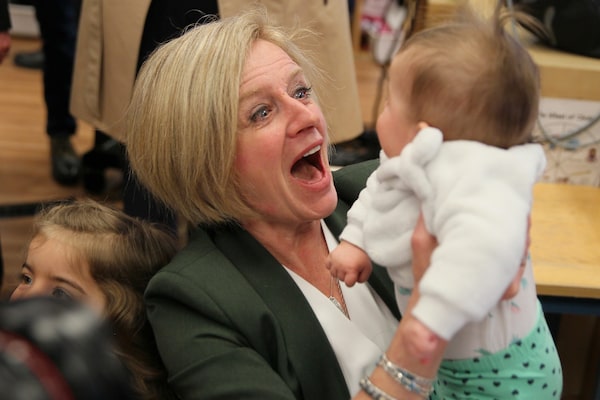
Alberta NDP Leader Rachel Notley holds Maia Louro, 4 months, as she makes a campaign stop at a daycare in Calgary on April 10. Albertans will head to the polls on April 16 to vote in the province's 30th general election.Dave Chidley/The Canadian Press
As the Alberta election is fought on issues of the economy and oil pipelines, the NDP has staked its re-election campaign on a major new social program: subsidized child care.
The proposal is a centrepiece of the NDP’s platform and represents new spending of $1.5-billion over the next five years, accounting for close to half of the party’s $3.2-billion in promises. The proposal would make $25-a-day child care available across the province by 2024 and add thousands of new spaces. It contrasts with the United Conservative Party, which does not mention child care in its platform.
The NDP frames its child-care promise in economic terms. The party predicts its plan would produce dividends above its cost as it boosts Alberta’s GDP. The party says the program would also narrow the work-force participation gap between women and men in Alberta. According to Statistics Canada, among people aged 25-54, Alberta has the highest rate of work-force participation among men in Canada (94 per cent) and the third-lowest among women (82 per cent). Quebec, with capped child-care fees since 1997, has the highest work-force participation rate for women (86.5 per cent).
“[Affordable child care] is critical for families and critical for the economy,” said Janet Eremenko, the NDP candidate in Calgary-Elbow. “The return on investment on child care, even in the most conservative estimates, is two-to-one.”
Ms. Eremenko and her husband have daughters aged 5 and 8. When the girls were younger, Ms. Eremenko worked part-time for a period because of child-care challenges. For several years, the couple paid more for child care than rent.
Four Canadian provinces set child-care fees for parents and provide operating funding. Quebec was the first, followed by Manitoba and Prince Edward Island. The most recent is Newfoundland and Labrador. The first three provinces have the lowest costs for parents in Canada and the price is falling in Newfoundland. Funding child care directly is “the right thing to do” in terms of spending options, said Martha Friendly, executive director at the Childcare Resource and Research Unit in Toronto.
Alberta and British Columbia are running pilot programs. In Alberta, there is a hint of the impact. Two years ago, the NDP started a pilot of its $25-a-day program and it now covers about 7,300 spaces out of 62,000. An annual survey by Ms. Friendly and economist David Macdonald of the Canadian Centre for Policy Alternatives found the median cost of child care for toddlers in 2018 in Calgary fell 2 per cent to $47 a day. In Edmonton, costs also fell 2 per cent, to $40. Costs are highest in Vancouver at $64 a day and Toronto at $62. In Montreal, it is $8 a day. St. John’s in 2018 saw a drop of 24 per cent to $33.
The UCP declined an interview request. The party reissued a statement it first put out on March 25, when the NDP announced its plan.
“We cannot afford massive new spending,” the UCP said. The party would consider “additional support for child care in the future, when Albertans can afford it.”
Political scientist Keith Brownsey at Mount Royal University said the NDP’s child-care proposal aims to woo voters in the centre and centre-right of the political spectrum.
“What the NDP is trying to do is appeal to the suburbs, especially in Calgary,” Prof. Brownsey said. “You do that by appealing to parents.”
Beyond the cost of child care, the NDP proposes to increase the number of spaces to 75,000 from 62,000, along with measures such as more training for staff, expanded use of a new curriculum and support for centres outside of the standard 9-to-5 hours.
Edmonton resident Bridget Casey voted for the provincial Liberal Party in 2015. This time, she will vote NDP. Ms. Casey runs Money After Graduation, a financial-advice website. Ms. Casey, whose daughter is 1½, looked for a child-care space when she was six-months pregnant but got stuck on wait lists. She worked part-time longer than she had planned until she found a spot for her daughter when the girl was 1.
“The government missed out on income taxes because I couldn’t find child care,” Ms. Casey said.
She is speaking out on Twitter about child care during the election. “A lot of people are blind to the need,” she said. “First, men don’t think of it. But this isn’t an issue I even thought about until I was 31, when I was pregnant.”
Anita Turna, chair of Alberta Association of Child Care Operators, represents a group of privately owned centres. The association is concerned about how the NDP would roll out the new system if elected and whether private operators could struggle for a period. The provincial $25-a-day pilot has been limited to non-profit centres. But Ms. Turna supports affordable child care.
“It has so many benefits for society as a whole,” she said.